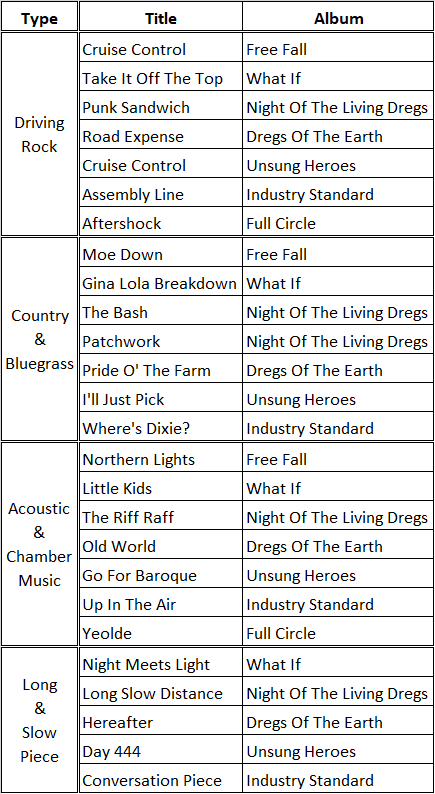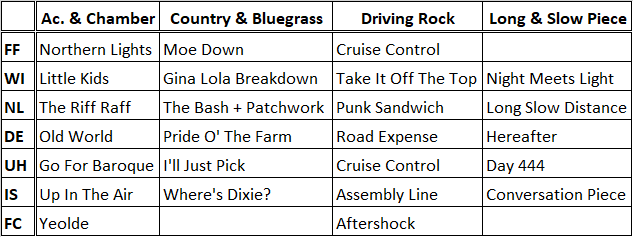(… endless waves …)
… of the Dixie Dregs is …
😶 Instrumental.
No words. No story. No message. Just music. Any reactions of the listener – feelings, or moods like joy, etc. – has to be evoked by musical means only.
(And keeping their attention can be a challenge.)
⏩ Virtuosic.
The Dregs can play fast. They use this skill to play tricky things. Even funny things.
(And to play music that you don’t hear from anybody else.)
☰ Polyphonic.
There are many (musical) things happening at the same time. Quite different things.
(The listening experience may require some concentration.)
Ⅲ Dense.
There are many (musical) things happening in a short time. Including unexpected things.
(No chance of getting bored.)
✵ Multistylistic.
(Does this word exist? 😉 ) There are many genres in the Dregs’ music, from: rock, jazz, funk, classical, folk, bluegrass …
(But, as always, it’s the result that counts. And the Dregs’ result is usually “more” than just a combination of these styles. It’s something where these different styles can “inspire” each other.)
But – listen for yourself.
Types of pieces
It can be noted that the Dixie Dregs maintain four types of pieces in such a way that there is one of these four types on almost any album. In the absence of an established scheme, I suggest calling these types:
DR – “Driving Rock”
CB – “Country & Bluegrass”
AC – “Acoustic & Chamber Music”
LS – “Long & Slow Piece”
Driving Rock: Uptempo, mostly guitar-dominated. No jazz, no time to take a break.
Country & Bluegrass: More Bluegrass than Country, actually. The rustic playing techniques of bass und drums often contrast with virtuosic melodies and complex chord progressions. Often at ridiculous speed, presumably quite fun to play.
Acoustic & Chamber Music: Often just played by the violin and the acoustic guitar. Chance of an emotional atmosphere, and some expressive moments. Including musical elements from Renaissance to Romanticism.
Long & Slow Piece: This kind of pieces (Andy West sometimes called them “mellow”) are the highlights among the Dregs’ works, IMHO. Melodic, soulful, yet complex. Music of a kind that I have not heard from any other band. Heaven.
The following table shows the pieces that I’d assign to these four types.

Grouped by album (name abbreviated, in first column):

Influences
Discussions about the various influences on a musician can be quite controversial. Steve Morse, helpfully, recorded two albums “Major Impacts” (2000 and 2004) with the very intention to show just these influences on his music: Guitar players (e.g., Jeff Beck, Jimmy Page), bands (e.g., Genesis, Allman Brothers), styles (e.g., Prog, Celtic).
Regardless of this (rather comprehensive) collection of names, I would like to point to two influences: 1. the most indirect one, 2. the most direct one, IMHO:
1. Johann Sebastian Bach (1685-1750)
The German composer is the only “classical” musician whom I noticed that Steve Morse mentioned in public, calling him “a genius”. In addition to some obvious similarities (polyphony/counterpoint), many rather hidden ones are perceptible in Steve Morse’s music – not only by me, but also by quite a few other people (e.g., album reviewers, YouTube commentors).
2. Mahavishnu Orchestra (1971-1973 period)
Besides the fact that this groundbreaking jazz fusion band had the same setup of instruments (the guitar, violin, keyboard, bass, drums) as the Dixie Dregs, it featured quite innovative music (mostly composed by guitarist John McLaughlin), combining a wide variety of styles. In developing their own musical concepts, the Dixie Dregs picked similar ingredients, and their piece “What If” (1978) can be seen as their continuation of the beginning of Mahavishnu Orchestra’s “Dawn” (1971).
Music influenced by the Dixie Dregs
While many guitarists name Steve Morse as one of their “heroes”, I have not recognized any composer of rock/jazz/other music doing so. Although I was quite eager to discover influences of the Dregs’ music in other people’s works, there are only two songs by (rather) mainstream rock bands in which I found them:
1. “The Calling” by Yes (album “Talk”, 1994, YouTube-Link)
In its instrumental bridge (from 3’12” to 3’46”) between second chorus and guitar solo, composer Trevor Rabin piles up several melodies over a repeated chord progression. To me, both this chord progression and these melodies sound like a reference to the Dregs’ music.
2. “Again And Again” by Phil Lesh & Friends (album “There And Back Again”, 2002, YouTube-Link)
This song, written by guitarist Jimmy Herring, contains guitar work that is quite similar to that in some of the long & slow pieces of the Dregs. It is played in the intro, during the verses, and in the instrumental bridge (from 2’36” to 3’46”) that culminates in a fantastic twin guitar solo. In my opinion, here Jimmy Herring is doing more than just referencing the Dregs’ music: He is making it his own.
(Note: 1999-2001, Jimmy Herring played with T Lavitz and Rod Morgenstein in the band Jazz Is Dead.)
Besides these “big names”, there are some other musicians, performing original music on YouTube with a note that it was influenced by Steve Morse or should serve as a tribute to him. Most of these tracks are related to the guitar playing of Steve Morse rather than to the music of Dixie Dregs. However, I’d like to mention two exceptions here:
* “Nightlight” by Dave Blick (YouTube-Link)
This piece is frankly inspired by “Night Meets Light” from the album “What If” (1978), but it is very original. The composer does not copy parts of the Dregs’ music (at least not on a small scale), but rather uses concepts and structures that are similar to those in “Night Meets Light” and fills them with his own ideas. The result is just great, IMHO.
* “Estudo em homenagem a Steve Morse” by NAMM (Núcleo de Artes Mozart Mello) (YouTube-Link)
In the video, this piece is played on one guitar (and some organ) only and in a rather technical style, but I think the composer captured many of the features of the Dregs’ music and combined them very well into this (somewhat edgy) track.
☞ ☞ ☞ If you happen to know other pieces that sound like being influenced by the music of Dixie Dregs, please contact me!
